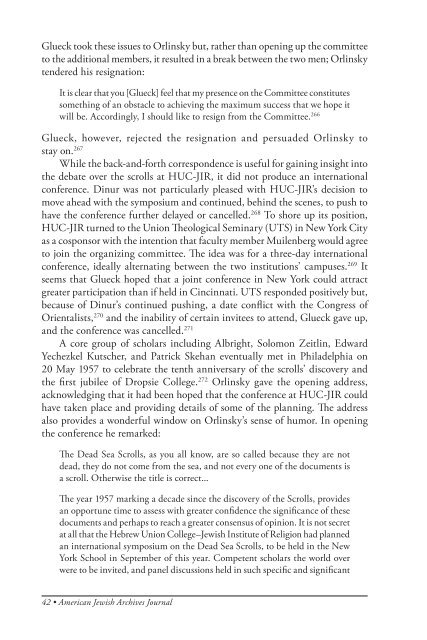The American Jewish Archives Journal, Volume LXI 2009, Number 1
The American Jewish Archives Journal, Volume LXI 2009, Number 1
The American Jewish Archives Journal, Volume LXI 2009, Number 1
You also want an ePaper? Increase the reach of your titles
YUMPU automatically turns print PDFs into web optimized ePapers that Google loves.
Glueck took these issues to Orlinsky but, rather than opening up the committee<br />
to the additional members, it resulted in a break between the two men; Orlinsky<br />
tendered his resignation:<br />
It is clear that you [Glueck] feel that my presence on the Committee constitutes<br />
something of an obstacle to achieving the maximum success that we hope it<br />
will be. Accordingly, I should like to resign from the Committee. 266<br />
Glueck, however, rejected the resignation and persuaded Orlinsky to<br />
stay on. 267<br />
While the back-and-forth correspondence is useful for gaining insight into<br />
the debate over the scrolls at HUC-JIR, it did not produce an international<br />
conference. Dinur was not particularly pleased with HUC-JIR’s decision to<br />
move ahead with the symposium and continued, behind the scenes, to push to<br />
have the conference further delayed or cancelled. 268 To shore up its position,<br />
HUC-JIR turned to the Union <strong>The</strong>ological Seminary (UTS) in New York City<br />
as a cosponsor with the intention that faculty member Muilenberg would agree<br />
to join the organizing committee. <strong>The</strong> idea was for a three-day international<br />
conference, ideally alternating between the two institutions’ campuses. 269 It<br />
seems that Glueck hoped that a joint conference in New York could attract<br />
greater participation than if held in Cincinnati. UTS responded positively but,<br />
because of Dinur’s continued pushing, a date conflict with the Congress of<br />
Orientalists, 270 and the inability of certain invitees to attend, Glueck gave up,<br />
and the conference was cancelled. 271<br />
A core group of scholars including Albright, Solomon Zeitlin, Edward<br />
Yechezkel Kutscher, and Patrick Skehan eventually met in Philadelphia on<br />
20 May 1957 to celebrate the tenth anniversary of the scrolls’ discovery and<br />
the first jubilee of Dropsie College. 272 Orlinsky gave the opening address,<br />
acknowledging that it had been hoped that the conference at HUC-JIR could<br />
have taken place and providing details of some of the planning. <strong>The</strong> address<br />
also provides a wonderful window on Orlinsky’s sense of humor. In opening<br />
the conference he remarked:<br />
<strong>The</strong> Dead Sea Scrolls, as you all know, are so called because they are not<br />
dead, they do not come from the sea, and not every one of the documents is<br />
a scroll. Otherwise the title is correct...<br />
<strong>The</strong> year 1957 marking a decade since the discovery of the Scrolls, provides<br />
an opportune time to assess with greater confidence the significance of these<br />
documents and perhaps to reach a greater consensus of opinion. It is not secret<br />
at all that the Hebrew Union College–<strong>Jewish</strong> Institute of Religion had planned<br />
an international symposium on the Dead Sea Scrolls, to be held in the New<br />
York School in September of this year. Competent scholars the world over<br />
were to be invited, and panel discussions held in such specific and significant<br />
42 • <strong>American</strong> <strong>Jewish</strong> <strong>Archives</strong> <strong>Journal</strong>

















